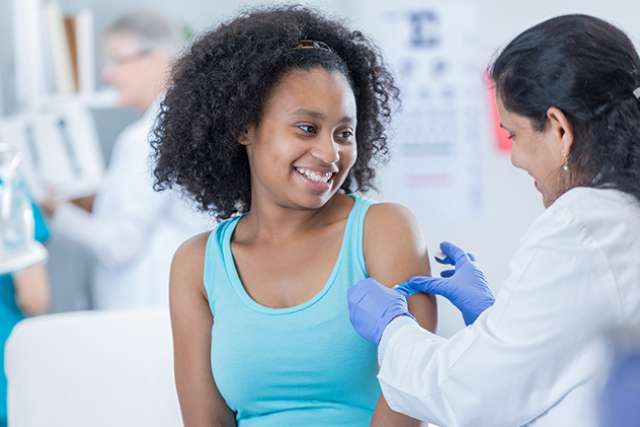Your teen needs fewer vaccines than when they were younger, but there are still specific vaccines they’ll need between the ages of 11 and 18. Set your adolescents up for a healthy future by ensuring they get the recommended immunizations.
Teen vaccine schedule
By age 7, your child should be up-to-date on the vaccines recommended by the Centers for Disease Control (CDC), American Academy of Pediatrics and the American Academy of Family Physicians. If not, they may need “catch-up” doses of the early childhood vaccines that protect against:
Viral infections
Viruses are often spread to children by coughing, sneezing or touching contaminated surfaces. Viruses infect a cell in the body, which acts as its “host” where the virus multiplies. Vaccinations protect against viral infections including:
- Hepatitis A and B, which can damage the liver
- Rotavirus, which can result in severe diarrhea
- Measles, which causes a cough, runny nose, fever, rash and severe complications
- Mumps, which causes painful, swollen salivary glands, fever and headache
- Rubella, which triggers a rash, fever and sore throat
- Chicken pox (varicella), which brings on a blister-like rash and fever
- Polio, which can cause paralysis
- Flu (influenza), which targets the lungs, nose and throat
Bacterial infections
As with viruses, bacteria are spread by coughing, sneezing or touching contaminated surfaces. They may be vulnerable to antibiotics. Vaccinations protect against bacterial infections such as:
- Diphtheria, a serious respiratory infection
- Tetanus, which causes debilitating muscle tightness
- Pertussis (whooping cough), which leads to violent coughing fits and difficulty breathing
- Haemophilus influenzae type b (Hib), which can cause pneumonia, blood infections and meningitis
- Pneumococcal infections, which can lead to pneumonia, blood infections and meningitis
Specific vaccines for teens
Recommended vaccines for teenagers include:
Human papillomavirus (HPV) vaccine
The CDC recommends children receive their first HPV vaccine at age 11 and a second dose 6 to 12 months later. HPV infection is common and can lead to cancer of the penis, anus, cervix and other body parts. Teens who receive the vaccine at age 15 or later will need three doses for maximum protection. The vaccine is most effective when given earlier, prior to sexual activity.
Meningitis (meningococcal) vaccine
Your teen will receive two doses of the meningitis vaccine — the first around age 11 and the second at 16. While rare, meningococcal bacteria can cause serious or deadly infections of the bloodstream, brain and spinal cord lining.
Flu shot
Your teen should continue to receive the flu vaccine every year — for life. Seasonal flu affects people from late fall to early spring, causing mild to severe respiratory illness. The flu vaccine is updated yearly.
Tetanus, diphtheria and pertussis (Tdap) vaccines
Your child received five doses of tetanus, diphtheria and pertussis during early childhood. At age 11 it is recommended they receive another combined vaccine to provide additional protection.
Extra vaccinations for high-risk groups
Teens who are considered high risk for certain diseases or infections may benefit from additional doses of vaccines. Your teen’s primary care provider will discuss if any extra vaccines are needed.
To ensure your teen is up-to-date on their vaccinations, schedule routine check ups appointment with their primary care provider. You can find a UCLA Health provider or call 310-825-2631.



